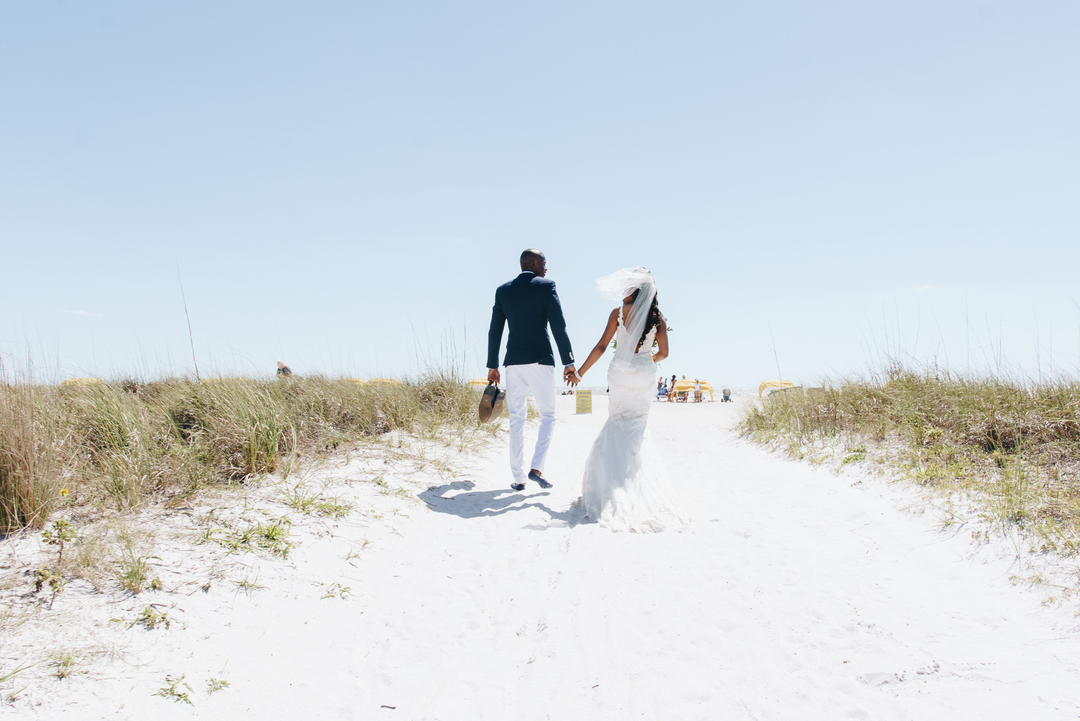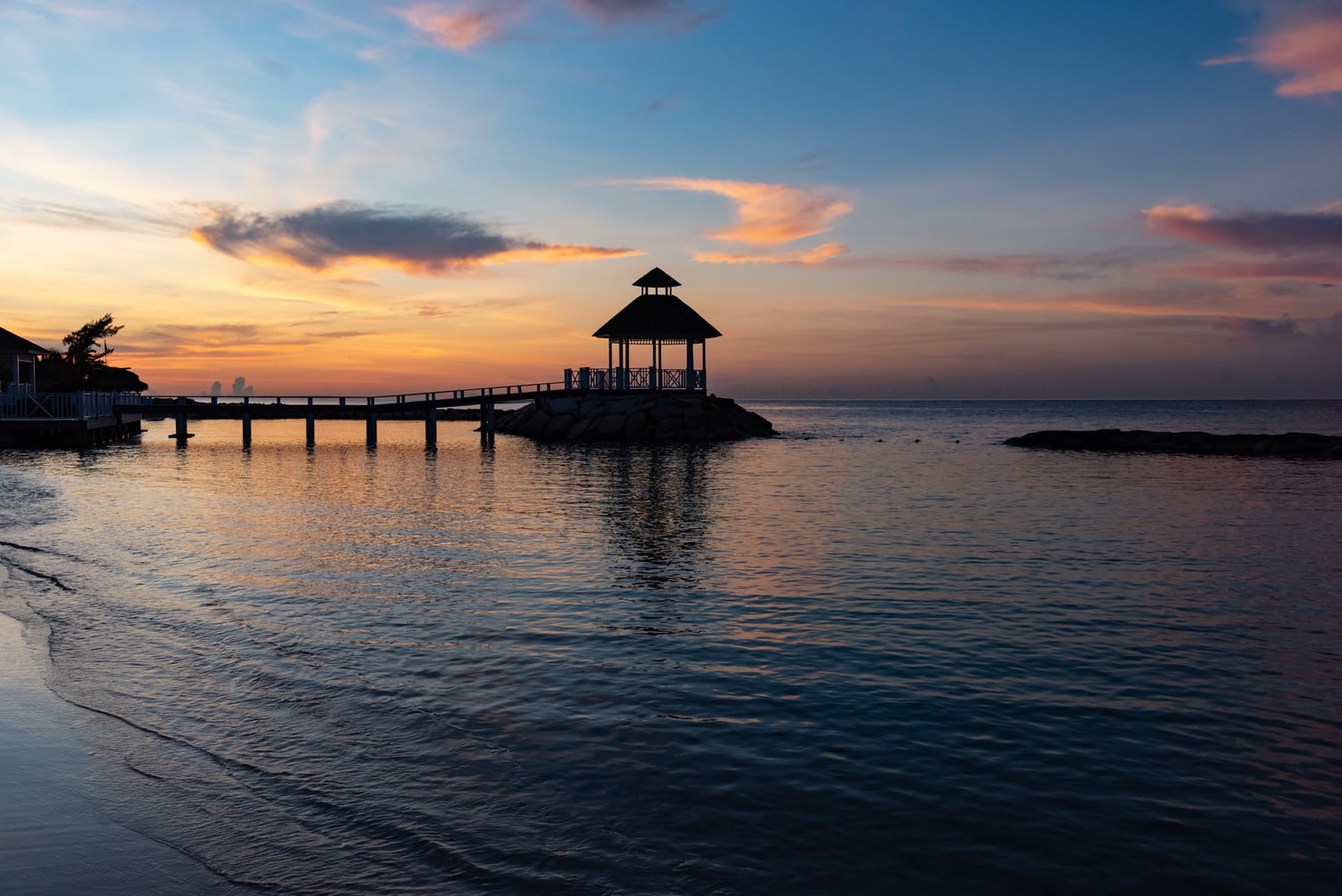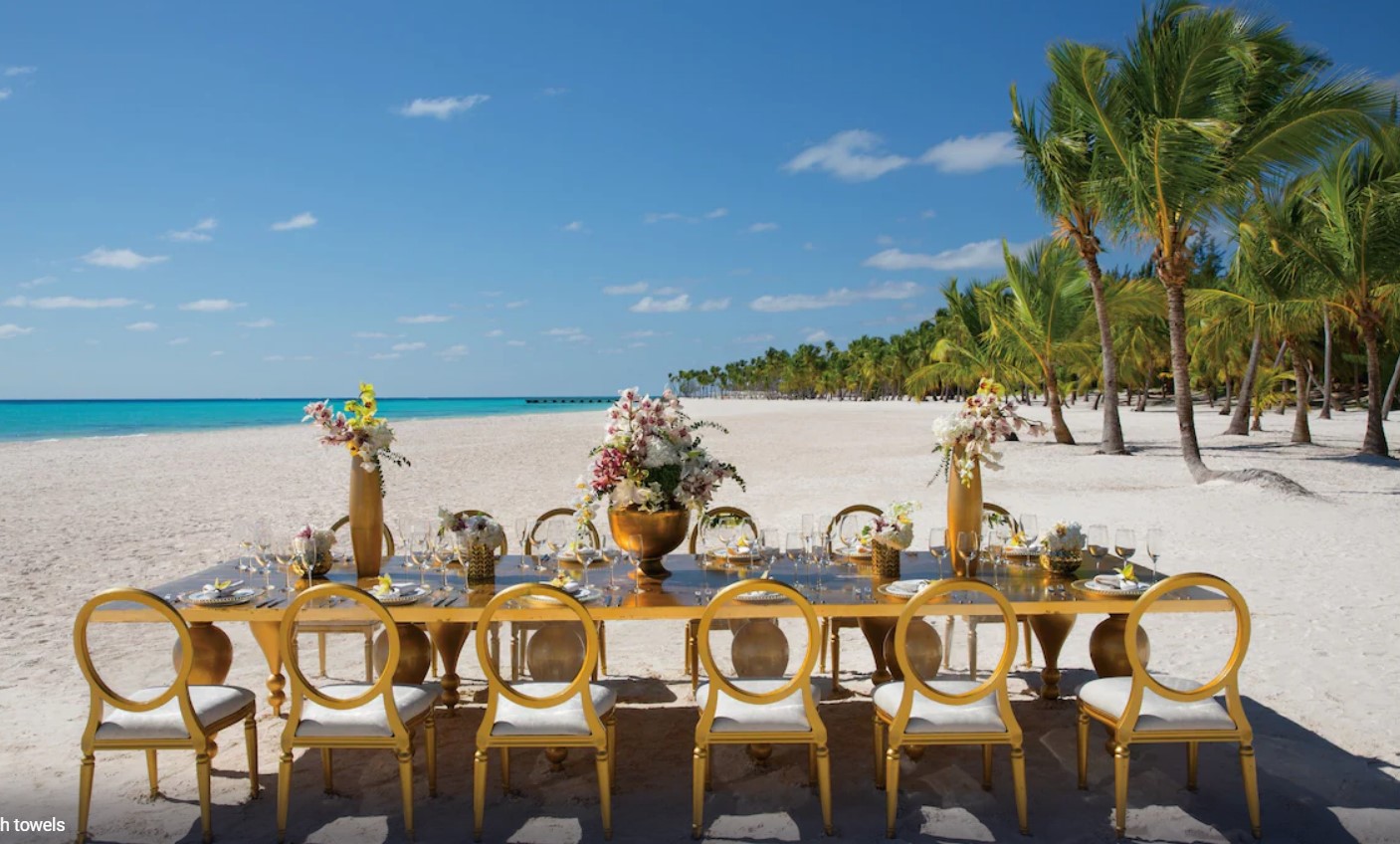Destination Wedding Cost + Tips to Cut Costs
Destination wedding cost averages $39,000. Compare domestic and international budgets, guest expenses and hidden fees to plan your dream celebration.

- Destination weddings cost $20,000-$40,000 for couples but can actually save money compared to traditional weddings since smaller guest lists (30-60 people vs. 100-200) reduce per-person expenses like catering and favors.
- Guests spend $1,500-$3,500 for domestic destinations and $2,500-$5,000 for international ones on flights, hotels, meals, and activities, which naturally limits your guest list to closest family and friends.
- Hidden costs add up quickly including marriage license fees, vendor travel expenses, foreign transaction fees, setup charges, and weather backup plans that aren't included in basic venue packages.
- Smart savings strategies include booking during shoulder seasons (25-40% savings), choosing all-inclusive packages, and using local vendors.
Destination weddings offer an exciting way to combine your celebration with a dream vacation, but understanding the true costs can feel overwhelming. The financial picture extends far beyond your venue package, involving everything from guest travel expenses to vendor logistics that don't exist with traditional weddings.
This breakdown covers what couples actually spend, what's included in different packages, and the hidden costs that catch many couples off guard. You'll also discover practical strategies to maximize your budget and create the destination celebration you want without financial surprises.
What Does a Destination Wedding Actually Cost?
A destination wedding is a celebration held away from where you live, typically requiring travel for most of your guests. These weddings range from intimate beach ceremonies to luxury resort celebrations, but they all share one thing: they cost differently than traditional weddings.
The average destination wedding costs between $25,000 and $40,000 for the couple. This wide range depends on several key factors that determine your final price tag. Your location choice creates the biggest cost difference, with Caribbean islands starting around $12,000 while European destinations can reach $50,000 or more.
Your guest count directly impacts every expense. Inviting 30 people versus 75 guests can double your total costs through accommodation blocks, catering, and activity planning. The season you choose affects pricing dramatically, with peak months demanding premium rates that can increase costs by 40%.
Package types vary from basic ceremony-only options to comprehensive celebrations including multiple events, premium vendors, and luxury upgrades.

Are Destination Weddings Cheaper Than Traditional Weddings?
The short answer: it depends on how you define "total cost." Destination weddings can be more budget-friendly for couples, but they shift costs to guests in ways that traditional weddings don't.
Traditional weddings accommodate larger guest lists, with couples typically inviting 100-200 people. Destination weddings naturally shrink to 30-60 guests because travel requirements filter your list to the most committed attendees. This guest count reduction creates immediate savings on per-person expenses like catering and favors.
The key difference lies in what's included versus what you pay separately:
- Traditional venue costs: You typically rent space and coordinate everything separately, with venues costing an average of $6,900 to $10,300 according to the Zola Wedding Cost Index (ZWCI).
- Destination package pricing: Many venues bundle ceremony space, basic décor, coordination, and sometimes accommodation into one price
- Vendor logistics: Traditional weddings use local vendors, while destination celebrations may require flying in your photographer or planner
Destination weddings often feel like better value because they can combine your wedding and honeymoon, eliminate the need for separate travel planning, and create intimate celebrations that focus on meaningful connections rather than large-scale entertainment.
What's Actually Included in Destination Wedding Packages?
Destination wedding packages vary dramatically between venues, making comparison shopping essential. Most packages include basic elements, but the details determine whether you're getting great value or hidden costs.
Ceremony and reception essentials
Basic packages typically cover your ceremony location, reception space, tables, chairs, and standard linens. Many include an on-site coordinator who handles day-of logistics and vendor communication. Some venues provide basic floral arrangements, candles, or décor elements that match their aesthetic.
“When it comes to selecting a venue, the top priority for nearly 60% of couples is the vibe.” - Emily Forrest, Head of Communications for Zola
Resort wedding packages often include these elements:
- Complimentary nights: Many resorts offer free accommodation for the couple when you book a minimum number of rooms
- Group dining credits: Rehearsal dinners or welcome receptions may be included or heavily discounted
- Spa and activity access: Guests can enjoy resort amenities during their stay
- Photography hours: Some packages include basic photography coverage, though most couples upgrade
Luxury packages add premium elements like upgraded linens, specialty lighting, live music, and premium bar service. The key is understanding what "basic" means at each venue and what upgrades cost extra.
Travel and logistics coordination
Your travel planning extends beyond booking your own flights and hotel rooms. Wedding party coordination requires advance planning to secure group rates and manage arrival timing for rehearsals and pre-wedding events.
Most couples cover accommodation for their wedding party as a thank-you gesture. This adds $200-500 per person per night depending on your destination's accommodation standards. Airport transfers need coordination, especially when your venue sits far from the airport or requires special transportation.
Group transfer services cost less per person than individual rides. Charter buses or large vehicles cost $75-150 per person for round-trip airport transfers. Private transportation for the couple ranges from $300-600 for wedding day use, depending on distance and vehicle type.
Factor transportation for off-site activities into your budget. Welcome parties at different locations, group excursions, or day-after brunches require additional coordination and costs that aren't included in basic wedding packages.
Vendor services and upgrades
Photography represents your biggest vendor decision for destination weddings. Local photographers familiar with your venue cost less than flying in your preferred photographer from home. Photography ranges from $3,200 to $4,800 according to the Zola Wedding Cost Index, reflecting the typical wedding photographer cost, but adding travel expenses can increase costs by $2,000-4,000 for non-local vendors.
Entertainment options depend heavily on your destination's local talent. Caribbean islands often have steel drum bands or calypso performers who understand resort acoustics and guest preferences. European destinations may offer classical musicians or local folk performers. DJ services in the US typically cost $1,300 to $1,900 per the Zola Wedding Cost Index, with local talent offering better value than importing entertainment.
Hair and makeup services require advanced research and often trial appointments during venue visits. While domestic ranges are between $800 to $1,200 according to the Zola Wedding Cost Index, local artists greatly vary depending on location. Many resorts partner with local beauty professionals who understand the climate and photography requirements for outdoor ceremonies.
Officiant arrangements vary by destination and legal requirements. Some locations require local officiants who understand marriage license procedures, while others allow you to bring religious leaders from home with proper documentation.

How Much Do Guests Really Spend?
Understanding typical guest spending helps you set realistic expectations and offer appropriate support.
Flight costs create the biggest variable in guest expenses. Domestic destinations like Hawaii or Florida cost guests $400-900 per person for flights, depending on departure cities. International destinations range from $1,000-3,000 per person for flights, with European locations typically costing more than Caribbean islands.
Accommodation expenses depend on your venue choice and group rates you negotiate. Resort accommodations cost $200-500 per night per room, with most destination weddings spanning 3-4 nights. Group rates can reduce these costs by 15-25% when you reserve room blocks early.
Daily expenses vary by destination and venue policies:
- All-inclusive resorts: Most meals and drinks are covered, but guests may spend $100-200 total on premium dining, room service, or off-property excursions
- Hotel venues: Guests cover all meals beyond wedding events, typically spending $75-150 per day on food and drinks
- Private venues: Guests need accommodation elsewhere and cover all meals, increasing daily expenses to $150-300
Activity costs for group events add to guest expenses. Welcome parties, farewell brunches, or optional excursions cost $75-250 per person depending on your plans. Many couples cover welcome events while making other activities optional.
Total guest spending typically ranges from $1,500-3,500 per person for domestic destinations and $2,500-5,000 for international locations. These costs explain why destination weddings naturally limit attendance to your closest family and friends.
Hidden Costs That Will Surprise You
Destination weddings include costs that don't exist for traditional celebrations. Planning for these expenses prevents budget overruns and last-minute financial stress during your celebration.
- Marriage license requirements vary significantly by location. Some destinations require blood tests, document translations, or witness fees. European locations may require residency periods before marriage, extending your stay and accommodation costs.
- Vendor travel expenses if you bring professionals from home. Factor in covering the cost for flights, accommodation, meals, and sometimes an additional fee.
- International transactions create ongoing fees when paying foreign vendors. Credit card foreign transaction fees add 2.5-3% to every purchase, while currency exchange rates can impact your final costs when rates fluctuate between booking and payment.
- Resort and venue fees often surprise couples with their scope and timing:
- Setup and breakdown fees: Non-standard arrangements like beach ceremonies or garden receptions may require additional setup costs
- Corkage and outside vendor fees: Bringing your own alcohol or outside vendors can trigger fees of $15-25 per bottle or $500-1,500 per vendor
- Mandatory service charges: Resort staff gratuities are often built into packages but may not cover exceptional service situations
- Weather contingency planning. Tropical destinations need backup plans for rain, requiring tent rentals, alternative indoor venues, or postponement insurance. These protections cost $1,500-4,000 but provide peace of mind during uncertain weather seasons.
- Guest hospitality expectations differ from traditional weddings. Welcome bags, group activities, and transportation coordination aren't included in basic packages but create memorable experiences. These thoughtful touches cost $75-200 per guest but significantly enhance the celebration atmosphere.
Money-Saving Strategies That Actually Work
Smart destination wedding planning can create significant savings without sacrificing the experience quality. These proven strategies help couples maximize their celebration while managing costs effectively, and a destination wedding checklist helps ensure no important detail is overlooked.
- Book during shoulder seasons for the best balance of weather and pricing. Late spring and early fall often provide 25-40% savings on accommodation and venue packages while maintaining pleasant weather conditions. Research local peak seasons carefully, as they vary by destination and can differ from general tourist patterns.
- Negotiate comprehensive group rates that extend beyond room discounts. Many resorts offer dining credits, spa discounts, or complimentary activities when you book 10+ rooms. Early booking often qualifies for additional perks like room upgrades or late checkout privileges.
- Choose venues with generous inclusive packages rather than bare-bones pricing that requires extensive upgrades. Some resorts include photography, upgraded dining, or premium bar service in their standard packages, while others charge separately for every element. Calculate total costs including likely upgrades when comparing venues.
- Embrace local vendors who understand your destination's unique conditions and vendor networks. Local photographers know the best lighting times and scenic locations. Local florists work with seasonal flowers that look fresh in the climate.
- Combine your wedding and honeymoon at the same destination to maximize travel investment. Extended stays often qualify for resort loyalty programs, room upgrades, or spa credits.
- Consider alternative venues beyond traditional resorts. Private villas, historic estates, or boutique hotels often provide better value and more personalization than large resort chains. These venues may require more coordination but offer unique experiences and often lower baseline costs.
Ready to Start Planning Your Destination Wedding?
Planning a destination wedding requires balancing your vision with practical budget considerations, but the result can be an incredibly meaningful celebration that combines your wedding and honeymoon into one unforgettable experience.
Start exploring wedding venues that match your style and budget, or honeymoon destinations. Zola's vendor marketplace makes it easy to compare packages, read reviews from real couples, and connect with experienced professionals.
Frequently Asked Questions
Can you have a beautiful destination wedding for under $15,000?
Yes, with careful planning and smart choices about location, guest count, and timing. Focus on all-inclusive resorts during off-season periods with guest lists under 40 people for the best chance of staying within this budget.
Should you cover costs for your wedding party at destination weddings?
Most couples cover accommodation for their wedding party as a thank-you gesture, especially since they're asking people to travel and take time off work. Flight costs typically remain the individual's responsibility unless you have a very small wedding party.
Do destination wedding guests spend less on gifts?
Yes, most couples expect and appreciate smaller gifts from destination wedding guests since attendees are already spending significantly more to celebrate with you than they would for a local wedding.
How far in advance should you book a destination wedding venue?
Book 12-18+ months in advance for popular destinations and peak seasons. This timeline allows for better venue selection, group rate negotiations, and gives guests adequate planning time for travel arrangements.
